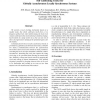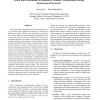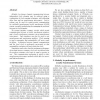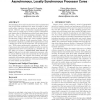68 search results - page 1 / 14 » Self-Calibrating Clocks for Globally Asynchronous Locally Sy... |
ICCD
2000
IEEE
14 years 1 months ago
2000
IEEE
We present a local clocking mechanism based on a tunable delay line which calibrates itself from a low frequency global clock. After initial tuning, the local clock remains calibr...
ISVLSI
2006
IEEE
13 years 10 months ago
2006
IEEE
This paper investigates the performance and power dissipation of Globally Asynchronous Locally Synchronous (GALS) multi-processor systems. We show that communication loops are a s...
ISCA
2002
IEEE
13 years 9 months ago
2002
IEEE
Due to shrinking technologies and increasing design sizes, it is becoming more difficult and expensive to distribute a global clock signal with low skew throughout a processor di...
ASYNC
2002
IEEE
13 years 9 months ago
2002
IEEE
Reliable, low-latency channel communication between independent clock domains may be achieved using a combination of clock pausing techniques, self-calibrating delay lines and an ...
ISLPED
2003
ACM
13 years 10 months ago
2003
ACM
Ever shrinking device sizes and innovative micro-architectural and circuit design techniques have made it possible to have multi-million transistor systems running at multi-gigahe...




